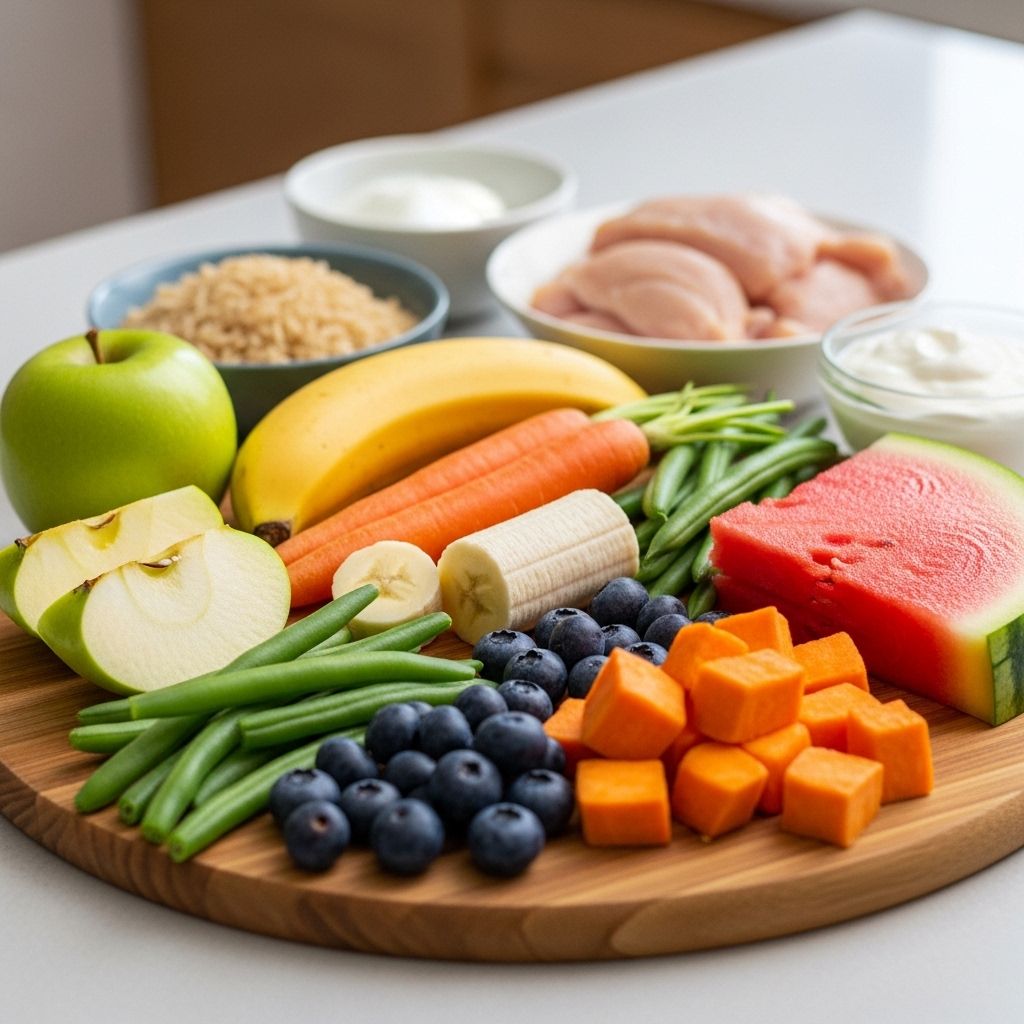Human Foods Dogs Can Eat: Complete Guide To Nutritious Snacks
Discover nutritious treats from your kitchen that keep your furry friend healthy and happy!

Image: HearthJunction Design Team
Safe Human Foods for Dogs: A Guide to Nutritious Snacks
Feeding your dog human food can be a great way to provide variety and nutrition, but it’s crucial to choose foods that are safe for them. Dogs have different nutritional needs and sensitivities compared to humans, so it’s important to know which foods are alright for sharing. Here, we explore the types of human foods that are safe for dogs to eat and those that should be avoided altogether.
##
Foods Dogs Can Eat
Bread
Dogs can eat bread, but it should be given in moderation. Bread does not offer much nutritional value and can cause weight gain if consumed in excess. Also, be cautious with bread that contains raisins or chocolate, as these are toxic to dogs.
Cashews
Yes, dogs can eat cashews. However, they should be given sparingly due to their high fat content. Avoid salted cashews, as excessive salt can be harmful to dogs.
Peanuts
Peanuts are safe for dogs to eat and are a good source of protein and healthy fats. However, always choose unsalted peanuts to avoid excessive sodium intake.
Popcorn
Dogs can eat unsalted, unbuttered, air-popped popcorn. It contains some beneficial nutrients like riboflavin and thiamine, which support eye health and digestion. However, ensure all kernels are popped to prevent choking hazards.
Pork
Pork is a highly digestible protein that can be beneficial for dogs. It’s less likely to cause allergic reactions compared to other meats. However, it should be cooked thoroughly to avoid bacterial contamination.
Quinoa
Quinoa is a nutritious food for dogs, providing a strong nutritional profile without the common allergens found in grains like corn, wheat, or soy. It is often included in high-quality dog foods for its health benefits.
##
Foods Dogs Should Avoid
Almonds
Almonds are not safe for dogs to eat. While they are not toxic, they can cause gastrointestinal issues due to their size and potential for obstruction. Additionally, they are rich in fat, which can lead to pancreatitis if consumed excessively.
Chocolate
Chocolate is toxic to dogs due to its theobromine content. The darker the chocolate, the more toxic it is.
Onions and Garlic
Onions and garlic belong to the
Allium family and can cause anemia and other health problems in dogs.
Raisins and Grapes
Raisins and grapes are toxic to dogs and should be avoided entirely.
Raw or Undercooked Meat
Feeding raw or undercooked meat can lead to bacterial infections such as salmonella or E. coli. All meat should be cooked thoroughly before being given to dogs.
##
Fruits and Vegetables for Dogs
In addition to the human foods listed above, some fruits and vegetables are safe for dogs to eat as treats.
Apples
Dogs can eat apples, which are a good source of vitamins A and C. However, remove seeds and cores, as they can be toxic.
Carrots
Carrots are a low-calorie snack high in fiber and beta-carotene, which supports vision health. They are safe for dogs to eat and can be beneficial for their teeth.
Celery
Celery is safe for dogs and can help freshen their breath. It contains vitamins A, B, and C and supports heart health.
Green Beans
Green beans are low in calories and can be a healthy snack for dogs. They are often included in dog diets as a low-calorie treat.
##
Cooking for Your Dog
Cooking meals for your dog can be a great way to incorporate human foods into their diet. Here are some tips and safe ingredients:
Lean Meats
Lean meats like chicken, turkey, or beef are good sources of protein. Remove fat and bones, and cook thoroughly to prevent bacterial infections.
Brown or White Rice
Rice is easy to digest and can be added to your dog’s meals. Brown rice is higher in fiber and nutritional value but should be given in moderation due to its calorie content.
Sweet Potatoes
Sweet potatoes are nutritious for dogs and provide dietary fiber and vitamins. They are easily digestible and can be a healthy treat.
##
Frequently Asked Questions (FAQs)
Q: Are all types of nuts safe for dogs?
A: No, not all nuts are safe for dogs. Almonds should be avoided due to potential choking hazards and high fat content. Cashews and peanuts are safe in moderation.
Q: How much human food can I give my dog?
A: Human food should make up no more than 10% of your dog’s diet. The bulk of their nutrition should come from a balanced dog food.
Q: What are some safe fruits for dogs?
A: Apples (without seeds or cores), carrots, and celery are safe fruits and vegetables for dogs. However, always introduce new foods gradually and in small amounts to monitor for any adverse reactions.
Q: Should I feed my dog raw meat?
A: No, raw meat can contain harmful bacteria like salmonella. Always cook meat thoroughly before feeding it to your dog.
Q: How can I ensure my dog gets all the necessary nutrients?
A: While human foods can be a nutritious addition to your dog’s diet, their main nutrition should come from a high-quality dog food. Always consult with a veterinarian for personalized dietary advice.
Conclusion
Feeding your dog human foods can be a fun and nutritious way to add variety to their meals. However, it’s crucial to choose foods that are safe and healthy for them. Always prioritize their primary diet of dog food and use human foods as treats in moderation. If you’re unsure about any food, consult with a veterinarian for advice.
References
- https://www.akc.org/expert-advice/nutrition/human-foods-dogs-can-and-cant-eat/
- https://www.akc.org/expert-advice/nutrition/fruits-vegetables-dogs-can-and-cant-eat/
- https://www.akc.org/expert-advice/nutrition/natural-foods/
- https://www.akcpetinsurance.com/blog/cooking-with-your-dog
- https://www.madisonpetclinic.com/articles/970634-may-newsletter-which-human-foods-are-safe-for-dogs
Read full bio of medha deb












